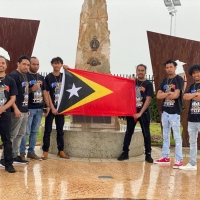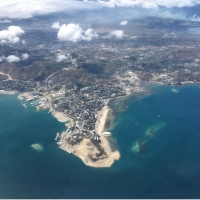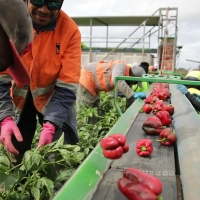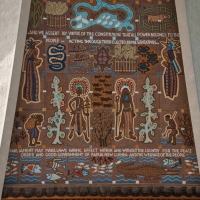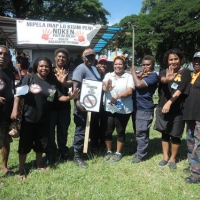- Home
- About
- People
- Publications
- Podcasts
- Asia & the Pacific Policy Studies
- Events
- Annual Australasian AID Conference
- The Mitchell Orations
- PNG Update
- Pacific Update
- Australian aid
- PNG Project
- Pacific Research Program
- Pacific migration
- PNG and Pacific scholars
- Global development policy
- Support us
- Contact us
- Drupal
Past events
Timor-Leste at 20: money from abroad, dreams of the island
9.30–11.45am 2 December 2021
Various
In 2018 remittances from abroad became Timor-Leste’s largest non-fossil fuel related source of income, before coffee but after aid.
With producing gas and oil fields almost dry and the development of new ones still uncertain, it seems likely that in Timor-Leste’s third decade labour sending will take on a degree of economic and social importance it has never had before.
This online seminar brings together work on this distinct and largely unanticipated new stage in the growth of Southeast Asia’s youngest nation.
How will development fuelled by money earned by Timorese workers and remitted directly to Timorese households look different from that occasioned by foreign donors and local bureaucrats based in Dili? An academic panel will present three papers related to this question, followed by a participant panel which will provide first-hand insights from workers who are in or have been to Australia as part of its Seasonal Worker Programme (SWP) and Pacific Labour Scheme (PLS).
Academic panel
Chair: Mark Notaras, Founder and Director, Timor-Leste Food Lab and Agora Food Studio
A ‘development nexus’? Remittances and grassroots development in Timor-Leste
Michael Rose, Research Fellow, Development Policy Centre, Australian National University
» view presentation
In this paper I suggest that the influence of remittances on development in Timor-Leste are best understood as emerging at the nexus of three distinct socio-economic-cultural spheres. The first of these is what I term ‘customary communalism’: a pervasive ethic in Timorese life defined by mutual aid, ritual exchange/feasting and the belief that health and fortune are tied, through the agency of watchful ancestral spirits, to one’s willingness/ability to fulfil ritual and social duties. The second is the deep influence of Indonesian models of education, enterprise and governance on Timor-Leste’s intellectual, commercial and civic life. The third is individual wage labour undertaken in the UK, South Korea and increasingly Australia. Money earned by individuals abroad is fed into interrelated, essentially communal kin networks throughout the island. Beyond immediate consumption, the grassroots development activities they facilitate (including education, improvements in housing stock, and small businesses) tend to resemble that seen in neighbouring provinces of Indonesia.
Life after migration: migration, urbanisation and mobility in Dili
Annie Wu, Assistant Researcher, University of Technology Sydney
» view presentation
This talk explores the geographical and social impacts of remittance-sending from Australia on households in Timor-Leste. It discusses the economic and social contribution that Timorese workers in Australia make to their extended kinship networks and to the community more broadly, and implications of these contributions for Timor-Leste’s future. Drawing on fieldwork undertaken in Dili as part of my PhD, I argue that circular migration to Australia under its Seasonal Worker Programme provides an impetus for urbanisation and sustainable development in Timor-Leste, and that returned workers form an important part of an emerging middle class in Dili.
Making money, missing home: experiences of Timorese labour migrants to the UK
Andrew McWilliam, Professor of Anthropology, Western Sydney University
» view presentation
In this paper I draw selectively on the results of a survey of 70 Fataluku-Timorese labour migrants, who have spent varying periods of time working in the United Kingdom, to highlight their diverse experiences of migration and return to Timor-Leste. The survey was undertaken in late 2019, just before the onset of the global pandemic and the shutdown of national and international borders that effectively ended this remarkable chapter of what had become a very popular, two-decade long option for aspiring Timorese migrant workers. A post-COVID landscape may yet see a resumption of this livelihood pathway, but it will do so in the context of a post-Brexit landscape in the UK and the growing popularity of new labour migration options on offer in Australia. The UK migration experience offers a useful comparative perspective on the benefits and challenges of pursuing transnational labour opportunities.
Participant panel
Since the restoration of Timor-Leste’s independence in 2002 travelling abroad for work has emerged as a defining adventure for its 1999 generation. Intensely patriotic, they are a group who often also feel frustrated by the lack of opportunities available for themselves and their families. They are urban and often highly educated but they typically remain mindful of obligations to custom and family in their home villages. Born in a time of war and isolation, they are able to send money and words across the world with ease. In this panel four Timorese workers will share, in discussion with Gordon Peake, their thoughts on the good and the bad of travelling and working abroad. They will tell us in their own words what their experiences – spanning from the streets of Dili to the mango orchards of Australia – have taught them about the state of their rai doben (beloved land), and the ways in which those who leave it to work remain passionate about and very much invested in its future.
Chair: Gordon Peake, Affiliate, Center for Australia, New Zealand and Pacific Studies, Georgetown University
Discussants:
Jomat Tapal, former SWP participant
Jomat Tapal has an Associate Degree in Management from Bellevue College in the United States. In 2017 he worked one season on a farm in Northern Australia has part of the SWP. He currently works for the UNDP in Dili.
Pedro Lay, current PLS participant
Pedro Lay is originally from Bobonaro in Timor-Leste. He previously studied information technology in Portugal and worked for many years in Northern Ireland. He currently works at an abattoir in Victoria with the Pacific Labour Scheme.
Simon Pedro, former SWP participant
Simon Pedro is originally from Baucau in Timor-Leste. He has a degree in IT and worked three seasons in Australia with the SWP. Since returning to Timor-Leste he has developed and run a business raising organic chickens.
Cesarina Doutel, former SWP participant
Cesarina Doutel is originally from Baucau in Timor-Leste. Between 2017 and 2020 she worked three seasons on farms in Queensland with the SWP. Since returning to Australia she has been studying at the National University of Timor-Leste.
» read more
Whose right? Forceful evictions of informal settlements from state land in Port Moresby, Papua New Guinea
1.30–2.30pm 26 November 2021
Dr Michelle Nayahamui Rooney
Over the decade 2012 to 2021, many residents living in the informal settlements of Port Moresby, the National Capital District of Papua New Guinea, were forcefully evicted from their homes. Some of these evictions involved state land registered to registered title holders. This paper presents results from a spatial-temporal analysis of the evictions of informal settlements during this period. A discourse analysis of court decisions is undertaken on seven case studies to understand how the courts deal with the rights of communities forcefully evicted from state land. The paper finds that the PNG court system focusses on determining the legal property rights over the land in question and court decisions tend to favour the legally registered owner of the title. Only limited attention is given to protecting the human rights of communities impacted by evictions from state land while ownership claims of Indigenous landowners are very marginal in the court processes. The findings suggest the need for urgent legislative and policy reforms to strengthen protections for the rights of communities impacted by mass evictions and the rights of Indigenous owners in these processes.
Speaker
Dr Michelle Nayahamui Rooney, Research Fellow, Development Policy Centre, ANU
Read the full paper, Whose Right? Forceful Evictions of Informal Settlements from State Land in Papua New Guinea’s National Capital District.
The ANU-UPNG seminar series is part of the partnership between the ANU Crawford School of Public Policy and the UPNG School of Business and Public Policy, supported by the PNG-Aus Partnership.
» read more
8,000 seasonal workers by 2025 from PNG
1–2pm 17 November 2021
Natasha Turia-Moka
» watch livestream replay
» view presentation
Since 2011 Papua New Guinea (PNG) has struggled to increase its participation in Australia’s Seasonal Worker Programme (SWP) and New Zealand’s Recognised Seasonal Employer scheme. In response, the PNG Government established an independent Labour Mobility Unit (LMU) in 2019 to boost its participation and send over 8,000 workers by 2025. The LMU partners with Provincial Governments and District Administrations to achieve that goal through a decentralised Regional Recruitment model. Under this model, there have been a few early wins with around 48 workers mobilised since late 2019 and another 184 workers that were due for mobilisation in March this year but were unable to travel due to COVID-19. This paper highlights some of PNG’s adaptations in its new recruitment model and focuses on: current recruitment pathways, rural community participation, funding support to reduce mobilisation costs, trusted intermediaries, and the need for a national labour mobility policy.
Speaker
Natasha Turia-Moka
PhD Scholar, Department of Pacific Affairs, ANU
Decentralisation in PNG: a political analysis
12.30–1.30pm 29 October 2021
Professor Stephen Howes, Dr Lawrence Sause and Dr Lhawang Ugyel
This paper provides an overview of decentralisation in Papua New Guinea (PNG) since independence, with a focus on political decentralisation. We show that PNG’s decentralised system has several distinctive and, in some cases, unique features. It is constantly evolving – in fact, heading in different directions. PNG’s system of decentralisation has become highly complex, with four tiers of government. It relies heavily, perhaps uniquely so, on indirect representation, with both provincial assemblies and district committees dominated by national politicians. We also argue that four political forces have shaped, and will continue to shape, PNG’s decentralisation reforms: the political dominance within the country of national members of parliament (MPs); the dominance, within that group, of district over provincial MPs; as a countervailing force, strong, though variable, political support for provincial autonomy; and, finally, the underlying clientelistic, fragmented and unstable nature of PNG politics. These findings are consistent with those of Spina (2013) in a very different OECD context.
Speakers
Professor Stephen Howes
Director, Development Policy Centre, Australian National University
Dr Lawrence Sause
Deputy Executive Dean (Resources and Planning), School of Business and Public Policy, University of Papua New Guinea
Dr Lhawang Ugyel
Lecturer, School of Business, University of New South Wales
This presentation is based on the speakers’ chapter in the forthcoming ANU-UPNG edited volume on contemporary issues in PNG.
The ANU-UPNG seminar series is part of the partnership between the ANU Crawford School of Public Policy and the UPNG School of Business and Public Policy, supported by the PNG-Aus Partnership.
» read more
Helping Family and Sexual Violence Survivors in Papua New Guinea – the Evaluation of six years of Femili PNG’s Lae operations
12.30–1.30pm 20 October 2021
Denga Ilave and Dr Judy Putt
» view presentation
» watch the recording
Femili PNG is a PNG NGO that operates case management centres to assist survivors of family and sexual violence to access the services they need.
Earlier this year, Helping Family and Sexual Violence Survivors in Papua New Guinea – the Evaluation of six years of Femili PNG’s Lae operations, was published. The Evaluation measured Femili PNG’s progress against its four main strategic priorities, which relate to service delivery and organisational resilience, and the impact Femili PNG was having on its clients, the local community and more broadly. The Evaluator, Dr Judy Putt, conducted 40 interviews, mostly face to face, with staff and stakeholders. Femili PNG also gave unfettered access to non-confidential information and reports, and provided invaluable statistics from its client data platform.
Femili PNG’s Operations Director, Denga Ilave, and Dr Putt discuss the Evaluation, methodology, findings and response.
Speakers
Denga Ilave, Lae Operations Director, Femili PNG
Dr Judy Putt, Research Fellow, Department of Pacific Affairs, Australian National University
» read morePages
Updated: 21 November 2024/Responsible Officer: Devpolicy Admin/Page Contact: CAP Web Team







